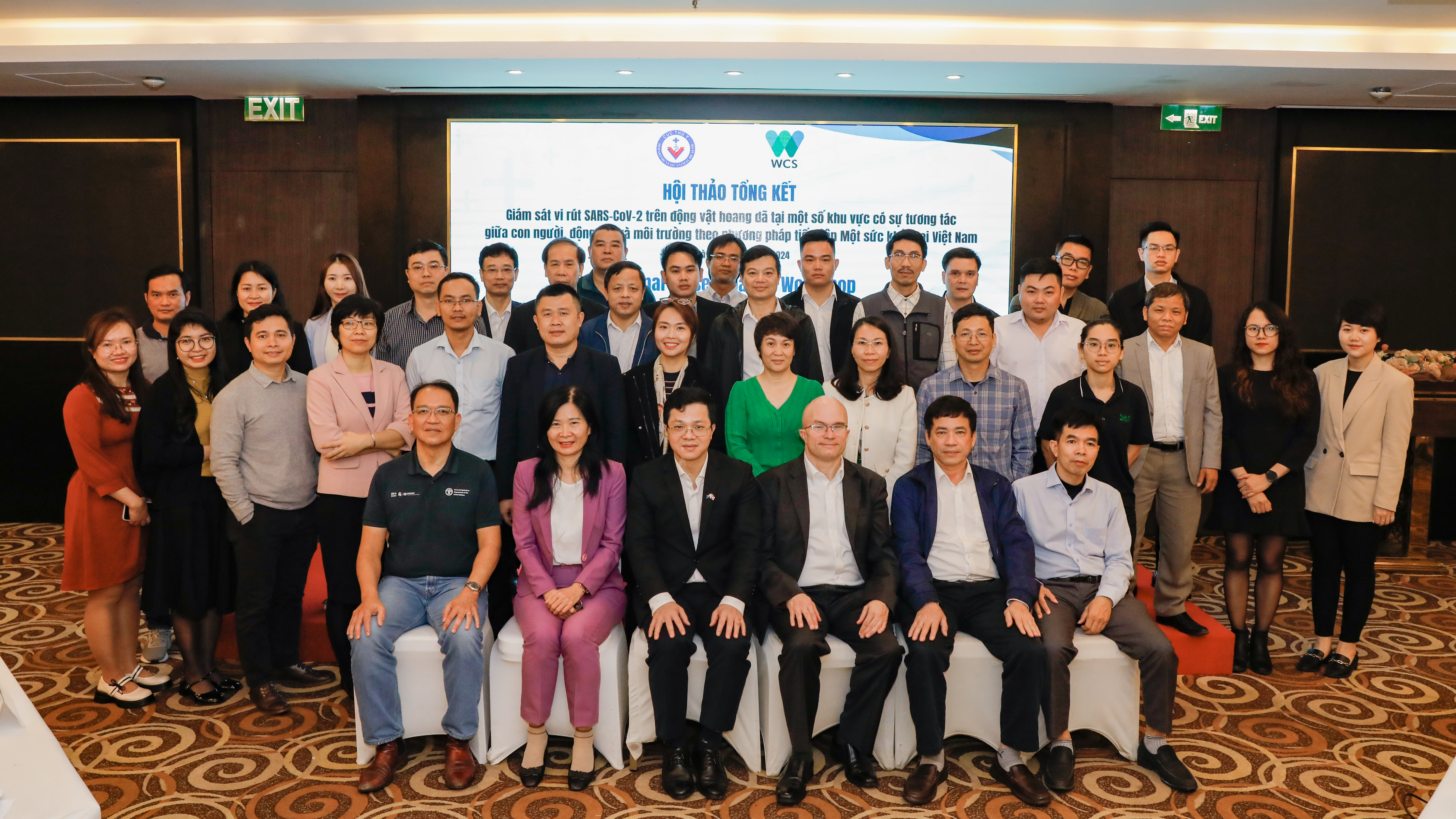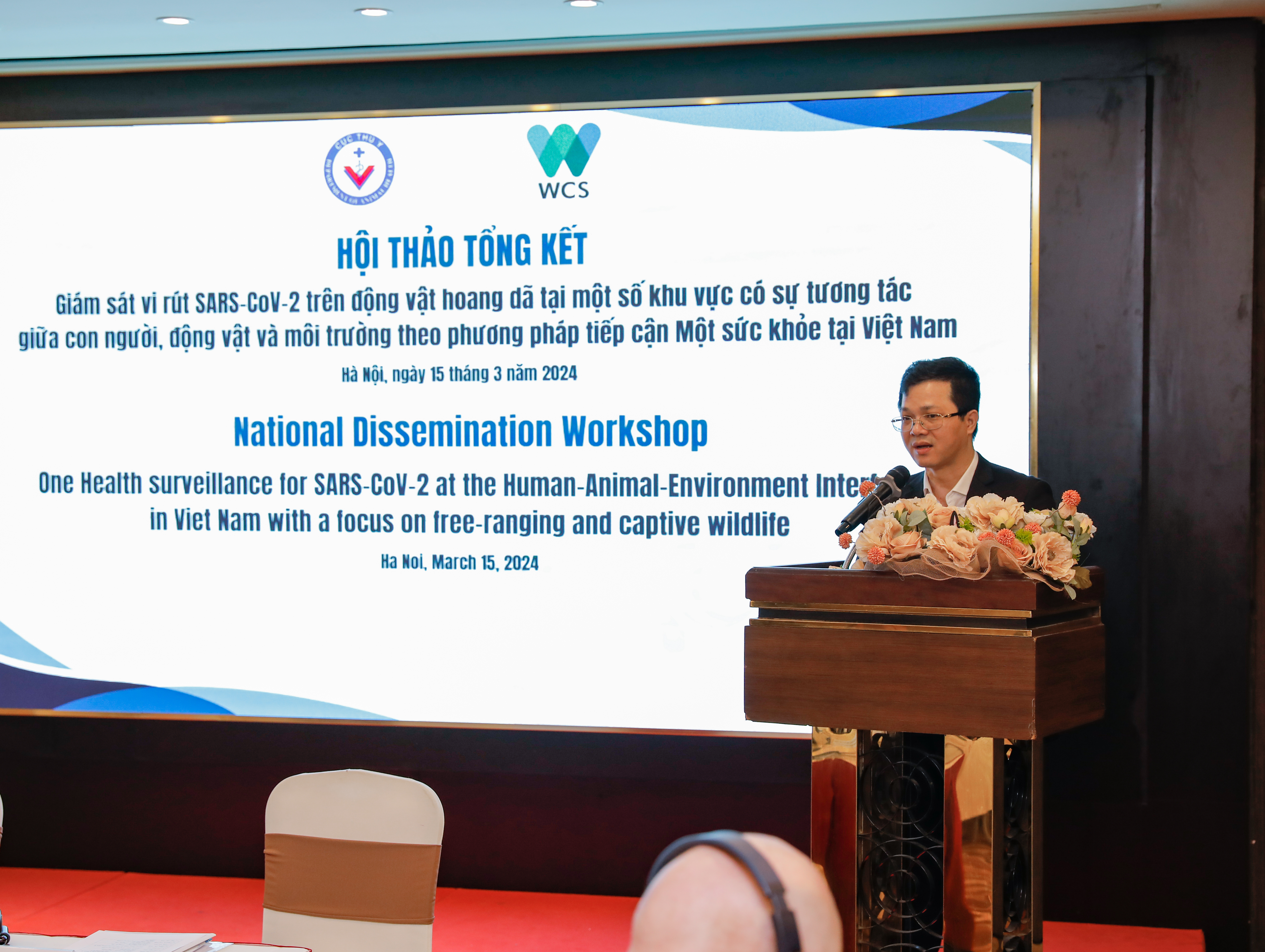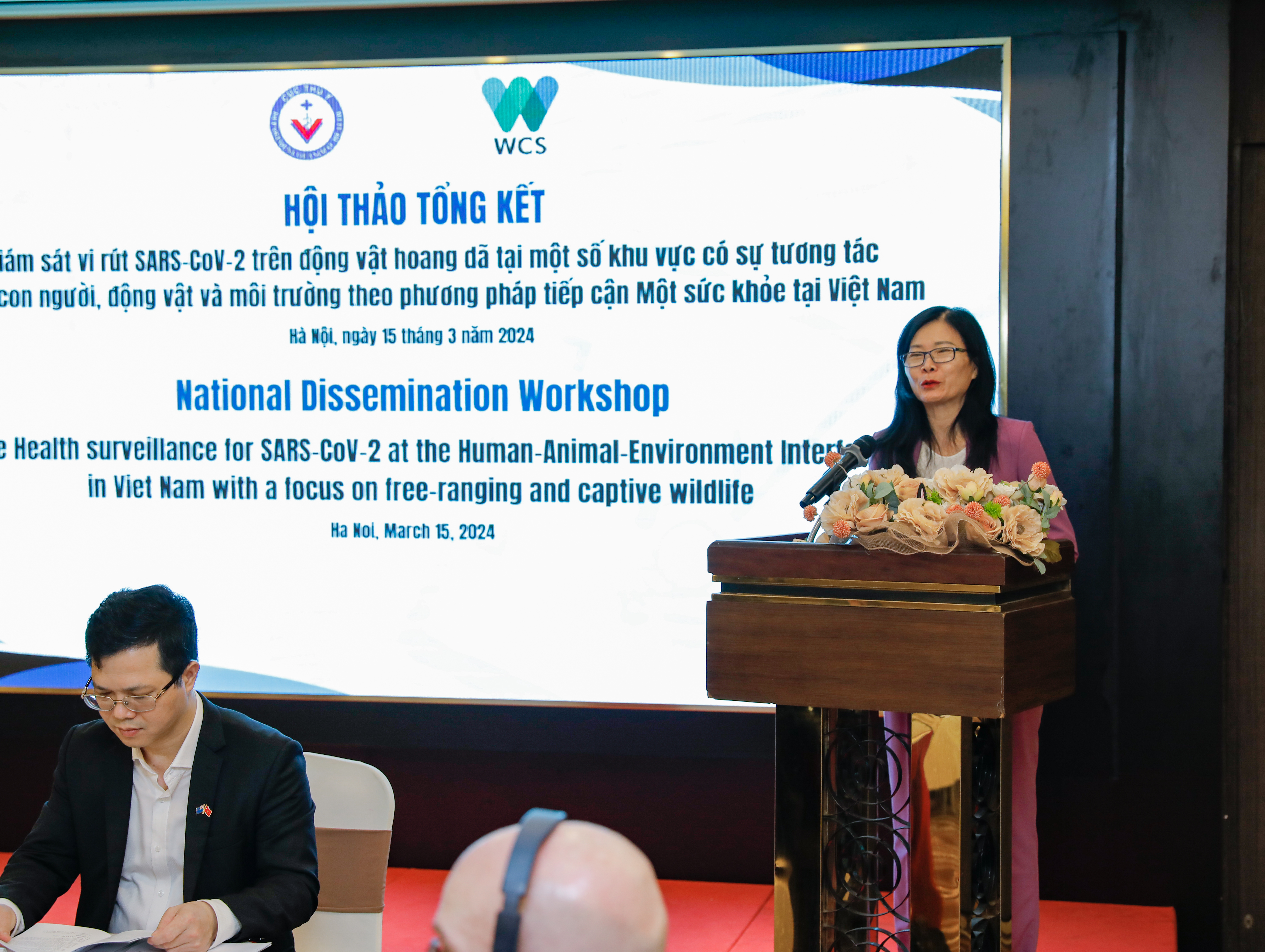National Dissemination Workshop for “One Health surveillance for SARS-CoV-2 at the Human-Animal-Environment Interface in Viet Nam with a focus on free-ranging and captive wildlife”
On March 15, 2024, in Ha Noi, about 45 representatives from Vietnamese government agencies, and international and non-governmental organizations joined the national dissemination workshop for “One Health Surveillance for SARS-CoV-2 at the Human-Animal-Environment Interface in Viet Nam with a focus on free-ranging and captive wildlife”. The surveillance project was co-implemented by the Wildlife Conservation Society, Viet Nam Office (WCS Viet Nam) and the Department of Animal Health (DAH), the Ministry of Agriculture and Rural Development (MARD) and the Institution of Ecology and Biological Resources (IEBR) during the period of July 2022 – March 2024, with support from the U.S. Centers for Disease Control and Prevention (U.S. CDC) and Health Security Partners (HSP). Representatives of animal health, human health, and forest protection agencies and laboratories including DAH, MARD; General Department of Preventive Medicine (GDPM), Ministry of Health (MOH); Regional Animal Health Offices No. 3 and 6; National Center for Veterinary Diagnosis (NCVD); Provincial Department of Animal Health and Production (sub-DAH) in Dong Nai and Nghe An provinces, Provincial Forest Protection Departments (FPD) of Dong Nai and Nghe An provinces, and Cuc Phuong and Pu Mat National Parks and research institutions of Vietnam National University of Agriculture such as Institute of Ecology and Biological Resources (IEBR) attended the workshop.

Participants in the workshop, Ha Noi, March 2024
To improve existing surveillance capacity for SARS-CoV-2 at the human-animal-environment interface in Viet Nam, WCS Viet Nam collaborated with DAH and IEBR to develop multiple activities on policy development, disease surveillance to monitor SARS-CoV-2 in wild animals and build capacity within the Vietnamese government agencies at the central level laboratories and in Dong Nai, Nghe An, and Ninh Binh provinces through training and involvement in project activities.
In coordination with the DAH and IEBR, different high-risk settings were selected for SARS-CoV-2 and coronavirus surveillance including bat roosts, wildlife farms, and wildlife rescue centers. During the project period (July 2022-March 2024), 2,856 samples were collected in total from 964 individual animals, including bats, civets, deer, dogs, pangolins, wild boar, bamboo rats, porcupines, and other rescued carnivores. A total of 1,416 samples were screened for SARS-CoV-2 and coronaviruses. The final results showed the presence of SARS-CoV-2 antibodies in two dogs raised in different civet and deer farms in Nghe An. Additionally, a bat from Pu Mat National Park, Nghe An province tested positive for a betacoronavirus (Cynopterus sphinx). The results from these surveillance activities were shared with the DAH and local authorities.
During field work activities, a total of 44 officers (from IEBR, RAHO 3, RAHO 6, Pu Mat National Park, officers from sub-DAH, district FPDs, Center of Agriculture Services, District Health Centers...in Dong Nai and Nghe An) completed training on the use of personal protective equipment and sample collection and transportation. In addition, WCS Viet Nam and DAH jointly developed a guidance document on SARS-CoV-2 surveillance of wildlife in Viet Nam for provincial authorities, interested organizations, and individuals in the wildlife sector, including veterinary, medical, and forest rangers. These agencies can use the guidance to monitor the SARS-CoV-2 virus for disease prevention, early detection, and treatment measures to proactively reduce the risk of SARS-CoV-2 virus spread to wildlife (including free-ranging and farmed wild animals).
Dr. Casey Barton Behravesh, Director of CDC’s One Health Office shared: “Conducting One Health surveillance for SARS-CoV-2 is necessary to track variants and mutations and to understand how SARS-CoV-2 spreads between people and animals. CDC and HSP are proud to have partnered with WCS Viet Nam to support this important work. The activities conducted through this project have not only strengthened wildlife surveillance in Viet Nam, but have also led to the development of guidance that can further support the advancement of One Health practices and policies throughout the country. WCS Viet Nam's successful coordination efforts to engage wildlife, human, and environmental agencies is commendable and an excellent example for other countries hoping to advance One Health activities that involve wildlife sampling.”

Dr. Nguyen Van Long, Director General of the DAH, MARD delivered the opening speech, Ha Noi, March 2024
Dr. Nguyen Van Long, Director General of the DAH, MARD emphasized: “Viet Nam shares the global concern regarding the wildlife health disease monitoring system development at the national level. We also recognize the lack of SARS-CoV-2 and other coronavirus surveillance activities in wildlife in high-risk human-animal-environment interfaces in Viet Nam. Given that context, this SARS-CoV-2 surveillance project promoted the incorporation of COVID-19 into the national health monitoring system to identify and address its threats to wildlife, and human populations.”

Ms. Hoang Bich Thuy, Country Representative of WCS Viet Nam delivered the opening speech, Ha Noi, March 2024
Ms. Hoang Bich Thuy, Country Representative of WCS Viet Nam, shared: “Our main objective was to improve existing surveillance capacity for SARS-CoV-2 at the human-animal-environment interface in Viet Nam. Our surveillance project emerged from a collaborative effort between animal health, wildlife management, and conservation agencies. This One Health approach, emphasizing cooperation and coordination on staff time and other resources among human, animal, and environment agencies, although their participation was still limited, at the provincial level is crucial for optimizing the effectiveness of individual sector surveillance systems and establishing strong linkages between them.”
Several on-going challenges in implementing SARS-CoV-2 surveillance in wildlife in Viet Nam were identified during the meeting. Participants also discussed potential resources and opportunities to resolve the highlighted challenges and gaps, including a focus on:
- How relevant functional agencies and organizations can contribute to build a sustainable national system for SARS-CoV-2 surveillance and,
- What supportive activities can be recommended for future projects to enhance and scale up surveillance, like standardizing SARS-CoV-2 surveillance into routine emerging infectious disease risk prevention and mitigation measures.
-------------------------------------------------------------------------
Download documents and photos at the following link.
For details, please contact:
Nguyen Dinh Thang, Communication Support Officer, WCS Viet Nam Office
106, D Building, No. 3 Thanh Cong Street, Thanh Cong Ward, Ba Dinh District, Ha Noi, Viet Nam
Telephone: 024 3514 9750
Mobile phone: 0339519500
Email: thnguyen@wcs.org
About DAH:
The Department of Animal Health (DAH) was established in 1966. DAH is the government organization directly under the Ministry of Agriculture and Rural Development (MARD), performing advisory functions, assisting the Minister in state management and organizing law enforcement on disease prevention and control, veterinary medicine and vaccines, food safety and animal products, under the management authority of MARD, as decentralized and authorized by the Minister.
Website: https://cucthuy.gov.vn/
About WCS:
WCS has worked in Viet Nam since 2006 with a focus on combating the illegal wildlife trade. WCS works to degrade, disrupt, and dismantle wildlife trafficking networks and reduce poaching pressure on wildlife populations. We facilitate collaboration and cross-agency action at domestic and international scales between key law enforcement agencies, the judiciary, natural resource regulatory agencies, and domestic and international non-governmental organizations. Our efforts have led to enhanced enforcement effectiveness through the successful arrest, prosecution, and conviction of wildlife criminals.
Website: https://vietnam.wcs.org/